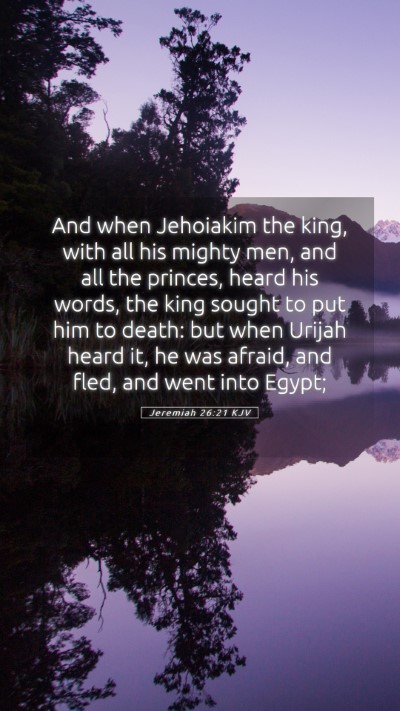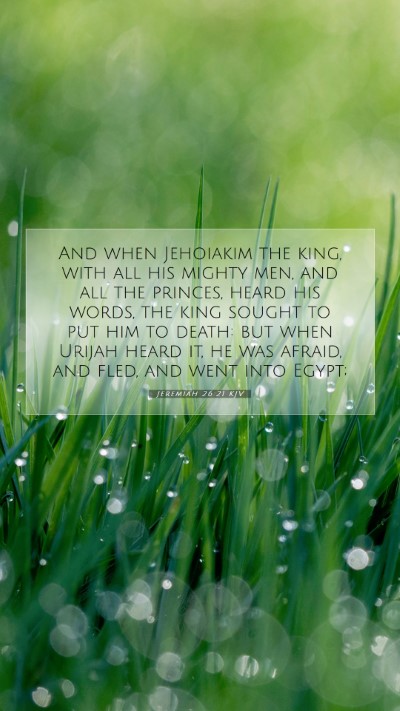Bible Verse Meaning: Jeremiah 26:21
Verse: "And when Jehoiakim the king, with all his mighty men, and all the princes, heard his words, the king sought to put him to death: but when Urias the son of Shemaiah heard it, he was afraid, and fled, and went into Egypt."
This verse describes a critical moment in the life of the prophet Jeremiah and highlights the tension between God's messengers and the ruling powers of their time. The encounter demonstrates the danger that true prophets often face when conveying God's word, particularly in a context of political power and authority.
Summary of Insights
- Muhammad Henry: Jeremiah's prophetic voice posed a threat to King Jehoiakim and his court. The king's reaction illustrates the historical enmity that exists between God's messengers and those in authority who oppose divine justice.
- Albert Barnes: The fear that overcame Urias and led to his fleeing into Egypt reflects the peril of carrying a divine message. It suggests a running away from one’s duty, showing the human tendency to prioritize self-preservation over God's commissioning.
- Adam Clarke: The mention of mighty men and princes hints at the insecurity of political leaders who feel threatened by God's truth. It reveals the conflict between divine instruction and human authority, a theme prevalent throughout the scriptures.
Understanding the Context
The context of Jeremiah 26:21 is crucial for a comprehensive understanding. This incident takes place during a turbulent period for Israel, marked by leadership that often contradicted God's commands:
- Historical Context: Jehoiakim’s reign was characterized by moral and spiritual decline, making the prophetic call for repentance particularly unsettling for those in power.
- Prophetic Role: Jeremiah, as a prophet, represented God’s voice; thus, the reaction of Jehoiakim signifies the hostility that often accompanies truth-telling in a corrupt society.
- Symbolic Flight: Urias’s flight to Egypt symbolizes not only fear but also a retreat from the authenticity of God’s message, reflecting a theme of exile throughout biblical narratives.
Application of Jeremiah 26:21 in Modern Life
This verse encourages believers to consider the implications of standing firm for truth, even when it incurs the wrath of authorities. It challenges individuals to reflect on the following:
- How do you respond to God's commands that may conflict with societal norms?
- In what ways can fear inhibit your witness for Christ?
- What support systems do you have in place to uphold God's truth against opposition?
Cross References
To deepen your understanding of this passage, consider these related verses:
- Jeremiah 20:1-2: The reaction of Pashhur, a priest, who also imprisoned Jeremiah for speaking the truth.
- Matthew 10:28: Jesus’ exhortation not to fear those who kill the body, highlighting the eternal perspective.
- Acts 5:29: The apostles' defiance of authority in order to obey God, reinforcing the theme of divine obedience over human command.
Conclusion
Jeremiah 26:21 exemplifies the historical conflict between prophetic voices and political power. Understanding this verse enriches our comprehension of Scripture, revealing the ongoing struggle between divine truth and human authority. For those seeking bible verse meanings and bible study insights, this passage serves as a poignant reminder of the complexities of faithfulness in the face of peril.


